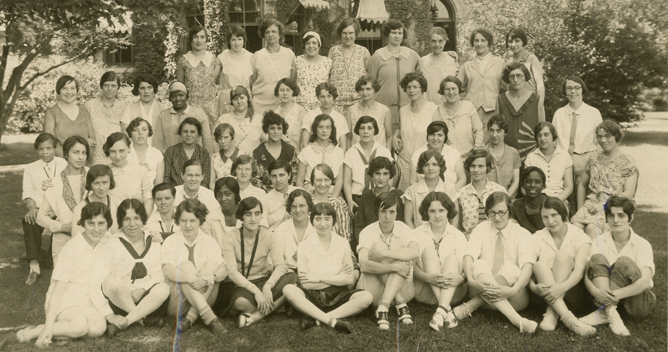Women's History in Archival Exhibits: A Plus for Academic Classes, a Threshold to Public History, or Problems of Scale Unaddressed?
Speaker Bio
Susan Tucker oversees the Newcomb Archives and special collections within the Vorhoff Library, Newcomb College Institute of Tulane University. A former Fulbright scholar to Iceland, Susan is the author of Telling Memories Among Southern Women (LSU Press, 1988), and other publications on material and archival history. Her co-edited book, The Scrapbook in American Life, won the Allen G. Noble Book award, for the best-edited book in the field of North American material culture.
Nancy Maveety is Professor of Political Science, Director of the Gender and Sexuality Studies Program and Project Director of the Beverly Blair Cook Papers at Tulane University. She is the author of Representation Rights and the Burger Years (Michigan, 1991) and Sandra Day O'Connor: Strategist on the Supreme Court (Rowman Littlefield, 1996). Nancy has worked with students in classes using archives, and recently worked with a student to create a website on the career of Beverly Blair Cook, a leader in second-wave academic feminism.
Jaelle Scheuerman joined Newcomb College Institute as a Tech Liaison in July 2010. She manages the Collat Media Lab, which aims to provide undergraduate women with technical skills by offering training, support and resources. She oversees an internship program that provides students the opportunity to work with faculty and staff on multidisciplinary projects with a digital media component. Prior to joining Tulane University, she worked in many roles as a technology professional including web design, application development, training and support. She received her bachelor's degree in computer science from the South Dakota School of Mines and Technology in 2010.
Candace Ross is a sophomore in the Tulane Business School. For the past two years, she has worked on the Newcomb College Oral History project, and also served as an intern in the New Orleans office of Senator Mary Landrieu.
Abstract
Digital archival programs today offer numerous examples of redefinitions and expansions, even mergings, of academic and public history. Multiple disciplines and community practitioners utilize online exhibits, for example, for diverse and long-lived purposes. We propose to address some of these multiple uses of history online in a panel discussion. The speakers (all part of collaborative work completed within the Newcomb Archives and the Collat Media Lab at Tulane University) will describe the creation of three online exhibits; the benefits of projects concerned with biography, oral history, and architectural history to local and virtual communities; the archival documents used in particular classes, and at the same time, those gaps in digital knowledge that reify a privileged access to collections. Underlying all their work has been a realization that there exists a need to educate more and more students about archives. If this education does not occur we are in danger of misinforming our students and the wider public—academic and public history audiences—about the great miles of documents, and thus the wide world of knowledge.
Women's History in Archival Exhibits: A Plus for Academic Classes, a Threshold to Public History, or Problems of Scale Unaddressed?
Digital archival programs today offer numerous examples of redefinitions and expansions, even mergings, of academic and public history. Multiple disciplines and community practitioners utilize online exhibits, for example, for diverse and long-lived purposes. We propose to address some of these multiple uses of history online in a panel discussion. The speakers (all part of collaborative work completed within the Newcomb Archives and the Collat Media Lab at Tulane University) will describe the creation of three online exhibits; the benefits of projects concerned with biography, oral history, and architectural history to local and virtual communities; the archival documents used in particular classes, and at the same time, those gaps in digital knowledge that reify a privileged access to collections. Underlying all their work has been a realization that there exists a need to educate more and more students about archives. If this education does not occur we are in danger of misinforming our students and the wider public—academic and public history audiences—about the great miles of documents, and thus the wide world of knowledge.
